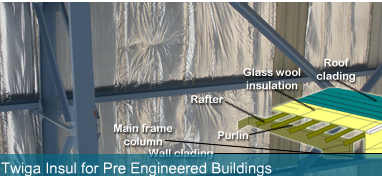Glass wool insulation India is getting very popular and there are lots of technicians and suppliers, who are doing insulation work very easily and effectively . Glass wool insulation can be fixed with wall through plastic batten and screw anchor inside plastic to reduce the thermal bridge effect.
 |
| twigafiber |
Glass wool Insulation can be attached with the wall by using adhesive too but as adhesive cannot guarantee perfect adhesion to the irregular surfaces and can be degraded by atmospheric agents it is recommended to use mechanical fastening as described above. In new construction, both fixing methods may be applied. Glass wool Insulation in India is one of the most widely used forms of insulations because of its thermal and acoustic properties, light weight, high tensile strength and exceptional resilience. Glass wool is one of the most dominant types of insulations preferred in applications with service temperatures ranging upto 250C.
Glasswool Insulation India is thermal and acoustic insulation which is used around the world in homes, commercial and industrial buildings as well as in vehicles. It is made from sand and recycled glass which blends and melted into a fibrous mat and bound together by resin. The material’s texture is similar to wool that is why the name ‘glass wool’. If a person inhale glass wool fibres into his lungs during installation, mostly the fiber dissolve inside the body and disappear quickly with no adverse health effects. Glass wool is an non-carcinogenic which does not cause cancer in humans. Glass wool is rot proof and odorless even it is non-combustible and non-emission of dense smoke and toxic gases. It is inorganic and does not encourage growth of fungi and vermin.
Glass wool vary in effectiveness depending on how they're made and how dense the final product is. Glass wool's R-value is provided as an overall value for a particular product. The individual fibres are held together with an binding agent which helps to hold glass wool together and give it strength. Glass wool is lightweight and also offers significant advantages during transport and installation. In addition, Glass wool is chemically inert and has no impurities like iron, sulphur etc.
Thus the main product is non-corrosive to metal which does not support any mold grow. This is manufactured from renewable raw materials which is environmental friendly in every stage. The world’s most liked and widely used insulation material which is glass wool, created from recycled glasses, bottles which make it ultra-eco-friendly.
 |
| twigafiber |
2. It’s simple to start getting the advantages of insulation at home with straightforward, quick and cost-efficient upgrades to existing insulation.
3. And with subsidies on the market it would not price something that is economical.








